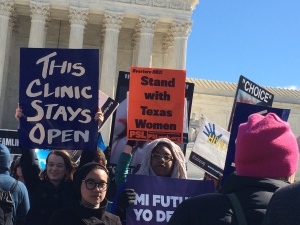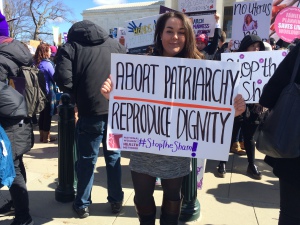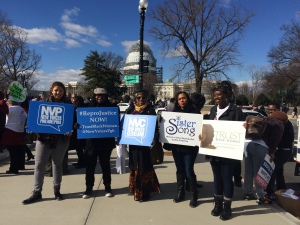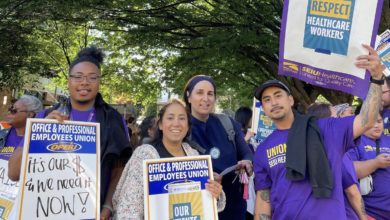
An important rally for women’s rights took place March 2 outside the Supreme Court during oral arguments in Whole Woman’s Health v. Hellerstedt, challenging anti-choice Texas House Bill 2 (HB2), which, if passed will deny 5.4 million women access to healthcare.
HB2 was initially partially passed in October 2013, placing arbitrary medical restrictions on clinics that provide abortion. It has been partially implemented, cutting the number of clinics down to just 19 from over 40. If the Supreme Court affirms or sends it back to the lower court, the entire state of Texas will be left with just nine clinics. These clinics are crucial because they provide more than just abortion; but also contraceptives, cancer and STD screenings. Often they are women’s only options for medical care.

If upheld, HB2 will have a rippling effect throughout the country. Already, 288 abortion restrictions have been implemented since 2010 according to the Guttmacher Institute. These last five years account for 27 percent of the total 1,074 restrictions enacted since the Roe v.Wade ruling in 1973.
Restrictions from HB2 would range from 24 hour “waiting periods” for patients to “consider their options,” forced ultrasounds, clinic doctors needing special privileges to provide abortions from a hospital within thirty miles of their clinic (even though many people do not live within 30 miles of a hospital), turning clinics into ambulatory surgical centers and forcing women to take medical abortion pills in front of their doctors instead of at home where it’s been considered safe.

Members of the Party for Socialism and Liberation joined with around 2,000 women who gathered outside the Supreme Court to defend their right to have safe and legal access to reproductive medical care. Women came from all over the country; from Nevada, Texas, Pennsylvania, New York, Virginia and other states. They were outraged that they were still fighting for the right to choose what to do with their own bodies.
Along the streets of the rally, women held a quilt made of patches with embroidered lines. Chi Nguyen, a graphic designer at the Center for Reproductive Rights in New York started this project with the Textile Arts Center and the Center for Reproductive Rights. According to Nguyen, the quilt represents the 5.4 million women who will be affected by HB2 if it goes into effect. Each stitch represents one woman, and the goal of the project is to eventually have 5.4 million stitches. They are currently at 300,000 and have received patches from 34 states and seven countries including Australia, the U.S., Mexico, Canada, France, Spain and the UK.
“I wanted to create a quilt to create a sense of security and also support for the 5.4 million women in Texas,” Nguyen said. “When you think about quilts you always think about security but the lack of access to health care is nothing but.” The Textile Arts Center and Center for Reproductive Rights will host “stitch-ins” to attain the 5.4 million lines needed for this ongoing project, which will be toured across the U.S. after completion.
Liberation News interviewed people attending the rally including Zachery Wolfe, an attorney who observed the arguments. Wolfe had the impression that the arguments went well. Even though the time ran out, the women justices made sure that there was enough time for the case to be heard. However, lawyers defending HB2 argued that there was no proof that the clinics that shut down the day that the law was enacted had closed because of these restrictions.
Liberation News spoke with Adel Vorse and Dyan Sautos from Texas who worked in a clinic that was one of the 21 that were forced to shut down last year after the partial implementation of HB2 because no hospital within 30 miles would give admitting privileges to their doctors. They both came because as Vorse stated they were “afraid this right [to have an abortion] will go away.”
Speaking of when the bill was first passed in Texas Sautos said “ … [it’s] scary to think this could happen. [The climate was] insane, women were so frightened, lines out the door in the the clinic, just this fear, in Houston right now we don’t have the three weeks wait like we do in Dallas, but if this law goes into effect it will be more than three weeks. I don’t even know if we will be able to do first trimester procedures because women wont be able to get in in the first trimester—the whole notion that its going to be safer is just a farce.”
This issue disproportionately affects Black, Latina and poor women. Women will always find ways to get abortions, but anti-choice laws make it financially inaccessible as some women have to drive hundreds of miles away, secure an overnight stay and find childcare in order to get to a place that provides abortions.
One of the many groups that came out for women’s rights was New Voices for Reproductive Justice, based in Pennsylvania and Ohio. They focus on leadership development, human rights and reproductive justice for Black women and girls, women and girls of color and the LGBTQ community, as well as year round integrated voter engagement programs and policy advocacy on a state and national level.
Liberation News spoke to Jasmine Burnett from New Voices for Reproductive Justice. She said, “There will always be people who can afford abortion, and most of those folks will not be people of color or poor. They will be white, people of means, people who have always had access. So that’s why these restrictions are important in terms of … overturning these restrictions. And making sure access is always available to the people who will always need it.” She further explained, “People come to us with our stories that are part of our leadership development conference and that’s what actually motivates them to do this work. Because there is a personal story, that’s what New Voices for Reproductive Justice is. People bring their personal story to their work and it makes them stronger advocates.”
On a personal level, Burnett shared that she had an abortion when she was 19, that’s what got her “invested in this work a long time ago. I’m here for the people who are afraid to speak up, who are paralyzed by stigma and shame, here for the people who can’t be here, here for every women who has had a abortion who has ever felt ashamed, who has ever felt she couldn’t talk to anyone, who has every felt alone in that experience.”
People of all ages, including college students, came out to stand against this anti-choice bill. A group of three students from George Washington University involved in the Women’s Leadership Program came out to fight for women’s rights. “For me personally, I just think that being pro-life in general doesn’t make any sense.”
Rebecca, one of the three GWU students said. “…the people who are ‘pro-life’ are [usually] anti-universal health care, anti-extended maternity leave, anti-contraceptive.” Rebecca also noted that the so-called “pro-lifers” don’t care about babies once they’re born, especially if they are of color or grow up to be LGBTQ.
Nicole traveled on a bus with Planned Parenthood from Richmond, Virginia to the attend the rally. She herself is a volunteer escort at an independent clinic back in Richmond. Her job is to ensure that patients do not get harassed by anti-choice protesters. According to Nicole, if the bill is upheld, this will mean that there will be a window for other states to be able to “follow [Texas’s] suit.”
A number of medical doctors and students also came to stand up against anti-choice laws. Andrea Huth is a fourth year medical student at a college in D.C. “I’m matching into OBGYN this spring and this is important to me because I want to provide comprehensive women’s health care. That includes cervical cancer screening and pap smears, that involves prenatal care and delivering babies, menopausal care and it has to include abortion care.”
Huth worked at Planned Parenthood during her undergrad in Minnesota. When she came to D.C. she became active with Medical Students for Choice and attended a Planned Parenthood rally. She said that it’s important for women to be out in the streets telling politicians that they can’t keep treating them negligently, especially since one in three women gets an abortion in their lifetimes.
It’s important for people everywhere to recognize HB2 and other laws like it for what they really are, an attack on women. Politicians want to control our bodies by taking away our right to an abortion, and by allowing employers to deny contraceptive coverage. When a woman carries a pregnancy to term she often has to choose between her safety and that of her baby or risk losing her job if she needs accommodations during pregnancy. After the child is born, there is no guaranteed paid or unpaid maternity leave. The United States is the only industrialized nation that does not have a law to mandate paid maternity leave.
Marcella Kocolatos, a non-profit attorney in employment law for reproductive rights and pregnancy discrimination in the workplace in NYC stated, “At the federal level there is no law that guarantees pregnant employees the right to reasonable accommodations in the workplace. In effect, [it] often means that women who are pregnant and have a minor medical limitation, such as a lifting restrictions or they can’t work a certain numbers of hours, end up being fired because at the federal level, currently, their employers have no obligation to accommodate them as long as they are not disproportionately targeting pregnant women. I think that the fact that there is any opposition to such a law shows how much the Right is not actually concerned with supporting families and babies and children. Supporting pregnant workers, women who choose to carry to term, you would think they would be doing that if they were interested in healthy outcomes for babies. But they are not doing that because they don’t care.”
This anti-choice bill and all the others like it are indicative of misogynistic policies produced from this capitalist system, which can only bring us back to the day where the only options were back alley abortions. It’s the time to unite against politicians who are taking away basic health care for women, people of color, LGBTQ people and working people! Only under socialism will these rights be guaranteed and not something we have to continually fight for.






